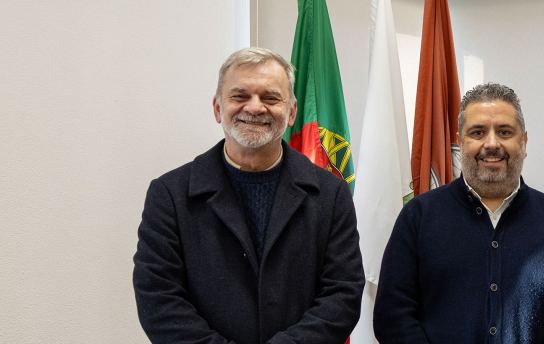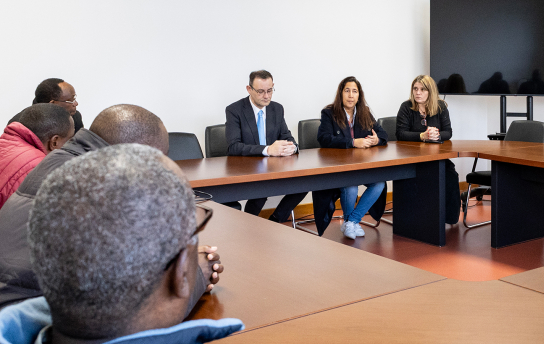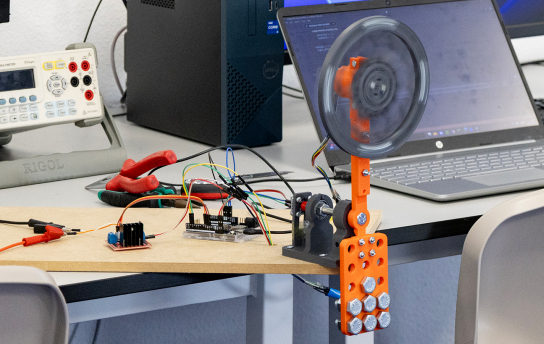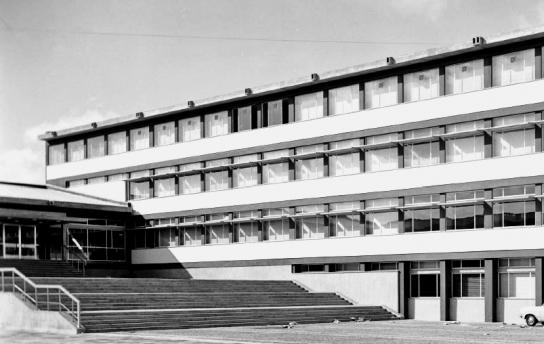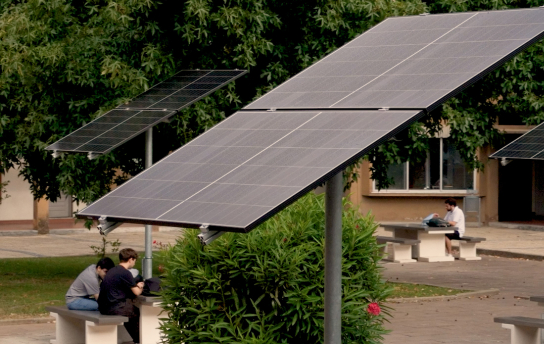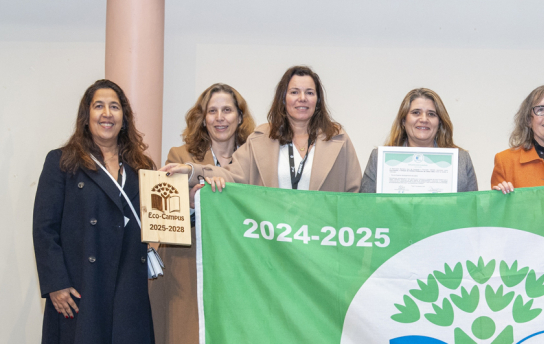On 9 January, ISEL held the ceremony for the new President of the Council of Representatives (CR) for the 2025–29 term, Professor Pedro Miguens Matutino (DEETC/ISEL).The President of ISEL, Professor José Nascimento, opened the session by outlining the electoral process — after the election of the CR members, the president is chosen from among their peers — and informed that the vote took place on 6 January. He expressed his thanks to Professor António Silvestre (DF/ISEL) and the outgoing council for their work, and wished the new team success.Next, the President of the Polytechnic University of Lisbon (IPL), Professor António Belo, spoke, highlighting the central role of the Council of Representatives as a body representing the entire community — faculty, students, and technical‑administrative and management staff — and reaffirmed IPL’s support for this term, valuing the broader community vision associated with the future university framework of the polytechnic education.Pedro Miguens Matutino thanked the academic community for its trust and set out a programme based on collaborative work among faculty, students, and staff, focusing on consolidating internal processes and institutional development projects. “I’ve been at ISEL since 2002, I wear the shirt and I want to help the school move forward,” he said.See the photo album on Flickr.
ISEL, together with the Polytechnic University of Lisbon (IPL), is part of the international consortium selected for the BRIGHTER project — Burundi Renewable Innovation Growth and Higher Education, funded by the Erasmus+ programme, with a total budget of around 1 million euros.ISEL‑IPL’s participation is ensured by a team composed of professors José Carlos Quadrado, Cristina Borges, Rita Pereira, and Carla Viveiros, strengthening the institution’s position in high‑impact international projects in the areas of Engineering, Pedagogical Innovation, and Sustainable Development.The BRIGHTER project aims primarily to enhance the quality of Higher Education in Burundi by training Engineering lecturers, modernising curricula, and developing skills in renewable energies and technological innovation, thereby promoting an effective connection between teaching, applied research, and sustainable development.The project’s kick‑off meeting took place between 16 and 18 December 2025, with the IPL hosting the international partners. On 18 December, the delegation visited the ISEL campus, where they were welcomed by the President, Professor José Nascimento, the Vice‑President for Pedagogy and Quality, Professor Carla Viveiros, and the Sustainability Advisor, Professor Patrícia Barata.Led by the ENTER Network, the consortium also includes ESN STUBA, the Ministry of Education of Burundi, five Burundian universities, and KIT – Digital Innovation HUB. The project foresees the development of training activities, institutional capacity‑building, and academic cooperation over the next four years.This European funding represents an important recognition of the role of ISEL‑IPL in international cooperation and its contribution to the global challenges of energy transition and the enhancement of Higher Education.See the photo album on Flickr.
On December 16, took place the final phase and presentation of projects for the first Collaborative Online International Learning (COIL), promoted by ISEL in collaboration with the Amsterdam University of Applied Sciences.This innovative project, dedicated to the theme Flywheel Inverted Pendulum (FLIP), ran from November 11 to December 19, 2025, involving students from the Bachelor's in Applied Physics Engineering (LEFA) and the Master's in Mechanical Engineering (MEM), along with ERASMUS students doing internships at ISEL and colleagues from Amsterdam.During this period, participants worked in international teams, developing laboratory activities and online meetings, guided by Professors Francisco Campos (DEM/ISEL), Manfred Niehus (DF/ISEL), Mário Mendes (DEM/ISEL), and Pedro Patrício (DF/ISEL).In the final session, which brought together students from Portugal and Amsterdam in an online format, the groups presented their projects, demonstrating technical skills in areas such as applied physics, sensors and actuators, automatic control (PID), Arduino, DC motors, and 3D printing, as well as transversal skills in collaboration, communication, and international networking.This initiative was integrated into the curricular unit Physics Engineering Workshops 3 – Estimation and Control of the LEFA program and constituted an extracurricular activity for MEM students.Check out the photo album on Flickr.
In 2025, ISEL’s Marvila campus marks 55 years since its first class. More than just a date, this milestone celebrates a journey built on knowledge, innovation, and commitment to society.The Marvila campus project was conceived in 1965 by architect Costa e Silva to address the need to replace the facilities on Rua Buenos Aires, which were inadequate for industrial education. Classes at the new location began in 1970, initially with only buildings E, G, and P. In 1974, after the April 25th Revolution, IIL was renamed Instituto Superior de Engenharia de Lisboa (ISEL).Over the decades, the ISEL campus gained new infrastructures and improved accessibility, such as the Chelas metro station. Today, it spans an area of 61,200 m², with seven buildings, laboratories, a library, auditoriums, sports and student spaces, and the Maria Beatriz Residence, becoming a true hub of knowledge.Attentive to today’s world, ISEL has established another key pillar: sustainability. In 2022, it was recognized as an Eco Campus by ABAE, reinforcing its commitment to responsible practices and a greener future. Beyond the various ecological initiatives promoted over the years, this purpose will also be embodied in the “ISEL Carbon Zero” student residence project, funded by the Recovery and Resilience Plan, scheduled for completion in 2026. For the north campus, new sports facilities and a research and advanced training HUB are also planned, featuring technology labs, training rooms, a start-up incubator, and business spaces.ISEL stands out as a center for the creation, transmission, and dissemination of science, technology, and culture, contributing to the quality and innovation that define engineering in Portugal and beyond. With 12 undergraduate degrees, 11 master’s programs, 9 postgraduate courses, and an intense activity in research, development, and innovation, it maintains a strong connection with society and the business and industrial sectors.As a curiosity, watch the video about the first classes at the Marvila campus, available in RTP’s archive..
The photovoltaic islands installed in the campus's internal gardens are the result of an innovative project that won 1st place in the Prémio Sustentabilidade, an initiative promoted by ISEL Eco-Campus in partnership with the Santander Foundation.Developed by undergraduate and master's students in Electrical Engineering José Marcos, Daniel Ferreira, and Marcos Diniz, the project proposes the integration of photovoltaic solar panels into garden tables and benches, allowing the generation of renewable electricity to power laptops, charge cell phones, and other electronic devices.Each photovoltaic island includes two solar panels that generate energy and a storage battery, allowing the system to be used even when there is no sun. The system integrates a charge regulator, which optimizes battery charging, and an inverter, which converts the energy produced to a voltage level suitable for the use of electrical equipment.The photovoltaic islands directly benefit the entire ISEL academic community, totaling approximately 4,000 people, in addition to external visitors. A recent example of its significant use occurred in August during the IAGA/IASPEI Joint Scientific Meeting 2025, where this equipment was widely used by participants.The Sustainability Award grants a cash prize to the winning students and additional funding for the implementation of the solutions on campus, ensuring their realization. The winning project stands out for its strong technological component, practical applicability, and relevant contribution to promoting sustainability and energy efficiency at ISEL.Meanwhile, the results of the second edition of the Sustainability Award have already been published, reinforcing the continuity of this initiative and its role in valuing sustainable innovation in the academic community.
On December 5, 2025, the “Eco-Schools of Higher Education and Eco-Campus Award” ceremony, promoted by the Blue Flag Association for Environment and Education (ABAAE), was held at the Polytechnic Institute of Tomar. The event was attended by a delegation from the Polytechnic Institute of Lisbon, composed of representatives from various organizational units.In recognition of the work developed at the institution in the area of sustainability and environmental education, ISEL once again received the Eco-Campus flag, revalidating the award for the 2025/2028 triennium. This distinction recognizes and reinforces ISEL's commitment to implementing sustainable practices aligned with the strategic pillars defined by the school's management.ISEL was represented by Professors Cátia Dias, Advisor for the academic area, Carla Viveiros, Vice-President for the pedagogical and quality area, Elisabete Alegria, Vice-President for the scientific area, R&D and projects, and Patrícia Barata, Advisor for the sustainability area and Coordinator of the ISEL Eco-Schools/Eco-Campus Program.At the invitation of the event organizers, Professor Patrícia Barata presented the ISEL Eco-Schools/Eco-Campus program and shared some of the main good sustainability practices adopted at the institution.Fotografias: ABAAE

